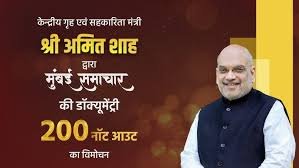Union Home Minister Amit Shah Honors Mumbai Samachar’s Legacy with 200 Not Out Documentary Release
Introduction: Celebrating a Historic Milestone
On September 8, 2024, Union Home Minister Amit Shah celebrated the release of “200 Not Out,” a documentary that pays tribute to Mumbai Samachar, India’s oldest continuously published newspaper. The event took place in Mumbai and marked the 200th anniversary of the paper, which has played a pivotal role in the history of journalism in India.
Mumbai Samachar: A Legacy of Journalism
Mumbai Samachar, established in 1822, has been a witness to India’s transformation over the centuries. Originally launched in the Gujarati language, the newspaper has been a significant medium for disseminating news, shaping public opinion, and documenting historical events. Over its two centuries of operation, Mumbai Samachar has chronicled the evolution of India’s political, social, and economic landscape.
The Documentary: “200 Not Out”
The documentary, titled “200 Not Out,” provides an in-depth look at the newspaper’s rich history and its contributions to Indian journalism. Directed by renowned filmmaker Rajesh Kumar, the film features interviews with journalists, historians, and other key figures who discuss the newspaper’s impact and its role in shaping public discourse. The release of the documentary was a testament to the enduring legacy of Mumbai Samachar and its commitment to journalistic excellence.
Amit Shah’s Tribute: Honoring Journalism’s Legacy
Union Home Minister Amit Shah, during the release event, praised Mumbai Samachar for its long-standing service to the nation. He highlighted the importance of preserving such historical institutions that have significantly contributed to the nation’s democratic fabric. Shah’s address emphasized the role of journalism in fostering transparency, accountability, and informed citizenship.
Impact on Modern Journalism
The release of “200 Not Out” is not only a celebration of Mumbai Samachar’s past but also a reflection on the evolving landscape of journalism. In an era dominated by digital media, the documentary underscores the importance of traditional print journalism and its role in maintaining journalistic integrity and historical documentation.

Why This News is Important
Preserving Historical Legacy
The release of “200 Not Out” is crucial as it preserves the legacy of Mumbai Samachar, an institution that has witnessed and documented significant historical events over the past two centuries. The documentary ensures that future generations recognize the importance of historical journalism and its impact on society.
Highlighting Journalism’s Role
By celebrating Mumbai Samachar’s anniversary, this event underscores the vital role of journalism in a democratic society. It reinforces the idea that media institutions are fundamental to maintaining transparency, accountability, and informed public discourse.
Educational Value
For students and scholars, the documentary serves as a valuable educational resource. It provides insights into the evolution of journalism and its role in shaping national history, offering a practical example of how media has influenced societal changes over time.
Encouraging Preservation of Legacy
The event encourages other historical media institutions to document and share their legacies. It highlights the need for preserving and valuing historical contributions to journalism and encourages efforts to maintain such records for future generations.
Inspiring Future Journalists
The documentary and the celebratory event inspire aspiring journalists by showcasing the enduring impact of quality journalism. It serves as a reminder of the profession’s historical significance and the high standards set by longstanding media institutions.
Historical Context
Mumbai Samachar: A Brief History
Founded in 1822, Mumbai Samachar is the oldest continuously published newspaper in India. It was initially launched as a Gujarati-language paper during the British colonial period. Over the years, it has adapted to changing times while maintaining its commitment to providing reliable news. The newspaper has played a crucial role in documenting India’s journey through independence, social reforms, and modern developments.
Evolution of Journalism in India
Mumbai Samachar’s history is a microcosm of the evolution of journalism in India. From the early days of print media to the digital age, the newspaper’s journey reflects broader changes in media practices and technology. The transition from print to digital formats and the rise of new media platforms have transformed the landscape of journalism, yet the foundational principles of responsible reporting remain unchanged.
Key Takeaways from “200 Not Out”
| Serial Number | Key Takeaway |
|---|---|
| 1 | Mumbai Samachar is India’s oldest continuously published newspaper, established in 1822. |
| 2 | The documentary “200 Not Out” celebrates the 200th anniversary of Mumbai Samachar. |
| 3 | Union Home Minister Amit Shah highlighted the importance of preserving historical media institutions. |
| 4 | The documentary provides insights into the evolution of journalism and its impact on society. |
| 5 | The event serves as a reminder of the critical role of traditional print journalism in a digital age |
Important FAQs for Students from this News
What is “200 Not Out”?
“200 Not Out” is a documentary celebrating the 200th anniversary of Mumbai Samachar, India’s oldest continuously published newspaper. It chronicles the history and impact of the newspaper over two centuries.
Who is the director of the documentary?
The documentary “200 Not Out” is directed by Rajesh Kumar, a renowned filmmaker known for his work in historical and biographical documentaries.
Why is Mumbai Samachar significant in Indian journalism?
Mumbai Samachar is significant as the oldest continuously published newspaper in India. It has played a crucial role in documenting India’s history, from colonial times through independence to modern-day events.
What did Union Home Minister Amit Shah say about Mumbai Samachar?
Union Home Minister Amit Shah praised Mumbai Samachar for its long-standing contribution to journalism and emphasized the importance of preserving historical media institutions for future generations.
How does the documentary impact modern journalism?
The documentary highlights the enduring value of traditional print journalism in the digital age and underscores the importance of maintaining high journalistic standards and historical documentation.
Some Important Current Affairs Links

















